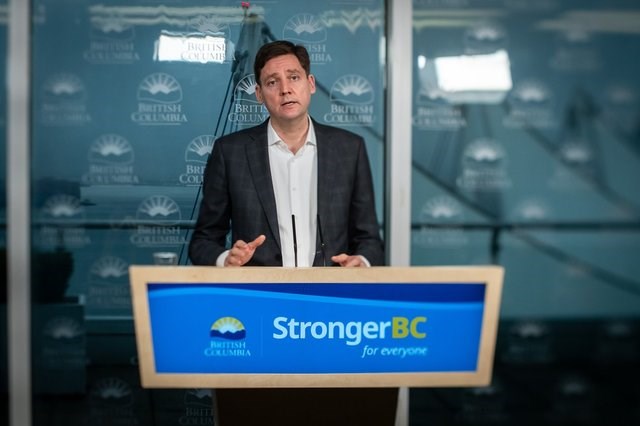
B.C. Premier David Eby speaks during a news conference in Vancouver, on Tuesday, Jan. 7, 2025. THE CANADIAN PRESS/Ethan Cairns
Republished May 12, 2025 - 5:05 PM
Original Publication Date May 12, 2025 - 12:11 PM
VICTORIA - B.C. Premier David Eby is "marching the province toward a confrontation" in which Speaker Raj Chouhan will have to cast a deciding vote to push through a bill to speed up certain infrastructure projects, a political scientist says.
Bill 15 proposes to accelerate some public and private projects to counter U.S. tariffs, but has drawn criticism from First Nations, environmentalists and opposition parties including the B.C. Greens, who said last week they won't support it.
UBC political science lecturer Stewart Prest said the Greens' opposition likely means Chouhan will have to break a tie vote on the bill, which doesn't fall under an agreement the New Democrats signed with the Greens in March to protect the government's slim government.
While Eby faces an "outside chance" his government will fall, Prest said he expects the bill that was tabled on May 1 will pass.
Interim B.C. Greens Leader Jeremy Valeriote said in a statement last week that his party agrees with the need to speed up the construction of hospitals, schools and public infrastructure.
However, the bill grants cabinet "sweeping powers" to bypass environmental assessment, municipal authorities and First Nations "under guise of fast-tracking major infrastructure" projects, he said.
Valeriote added his party is concerned with the bill's provision that allows the province to approve projects it deems of "provincial significance — a term that remains undefined and vague."
Prest said forcing the bill through would come at the cost of "burning a variety of bridges" with key groups that have historically supported New Democrats, including First Nations.
Eby has acknowledged opposition from First Nations and others, but added the government will address their concerns through regulations, and that it won't change the constitutional obligation the province has to consult with First Nations.
First Nations appear unconvinced. Judith Sayers, president of Nuu-chah-nulth Tribal Council, has become the latest prominent First Nations' leader to criticize the bill.
Sayers said in a statement Monday that legislation "done in a rush will backfire" on relations between government and First Nations, reconciliation and work around the implementation of the United Nations Declaration on the Rights of Indigenous Peoples.
The bill also received criticism last week from the First Nations Leadership Council representing the Union of B.C. Indian Chiefs, the B.C. Assembly of First Nations and the First Nations Summit.
Eby met last week with the council, which has called for him to withdraw the bill and start again.
The premier said on CHEK News last week that the bill is going ahead and it would be a confidence vote, meaning the government could fall if it loses the vote.
Sharon Singh, a lawyer and co-leader of Indigenous and Environment practices at McMillan LLP, said it should be up to the electorate, not cabinet, to designate which projects are provincially significant.
"I think a lot of individuals take umbrage with that," she said.
She added that concerns by First Nations about the rollout of the legislation are genuine.
"They're not arbitrary concerns," Singh said.
However, Singh said she sees nothing in the act that overrides existing environmental protections or constitutional obligations by government to consult with First Nations on various projects.
"I think it's actually a tool that is necessary to try and unstick some of the backlog we're in," she said.
Permitting was an issue during the last provincial and federal elections, she noted.
"Now, you have a potential tool that's seeking to address that," she said. "If it is done right, this could be a good step forward."
The bill could actually be an example for the federal government to follow, she said.
The legislation has drawn comparisons to Bill 7 that would have given cabinet unprecedented power to push through measures in response to American tariffs.
Conservative Party of B.C. Leader John Rustad said Bill 15 is a rehashed version of Bill 7.
"This is a power grab by David Eby to move forward projects."
But Prest said that unlike Bill 7, Bill 15 has supporters.
The New Democrat government is taking a risk with the bill, he said.
Not only does it reinforce the "narrative" that this government is unaccountable, it also creates the prospect that the public will blame the NDP for years, if not decades, if projects pushed forward under this bill go sideways, Prest said.
This report by The Canadian Press was first published May 12, 2025.
News from © The Canadian Press, 2025